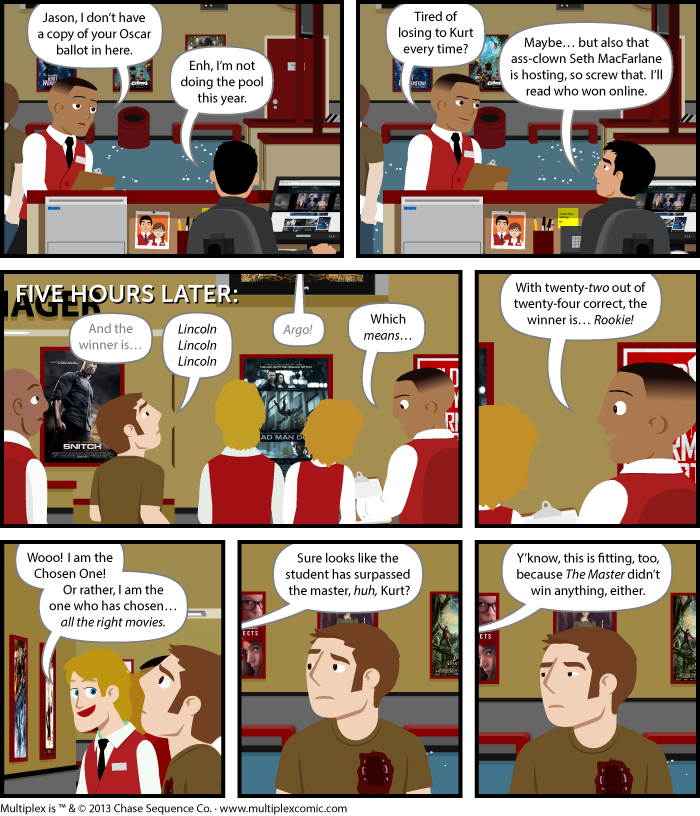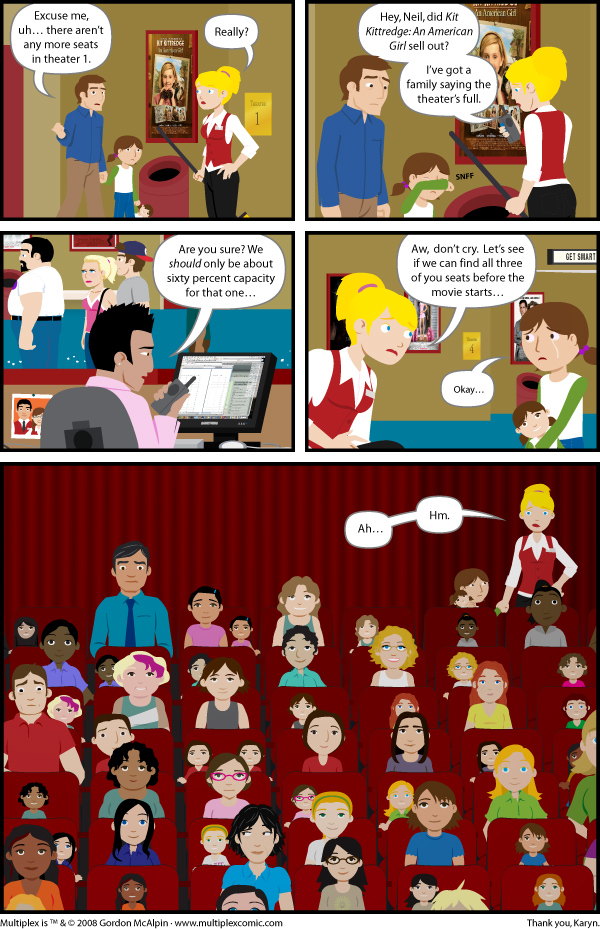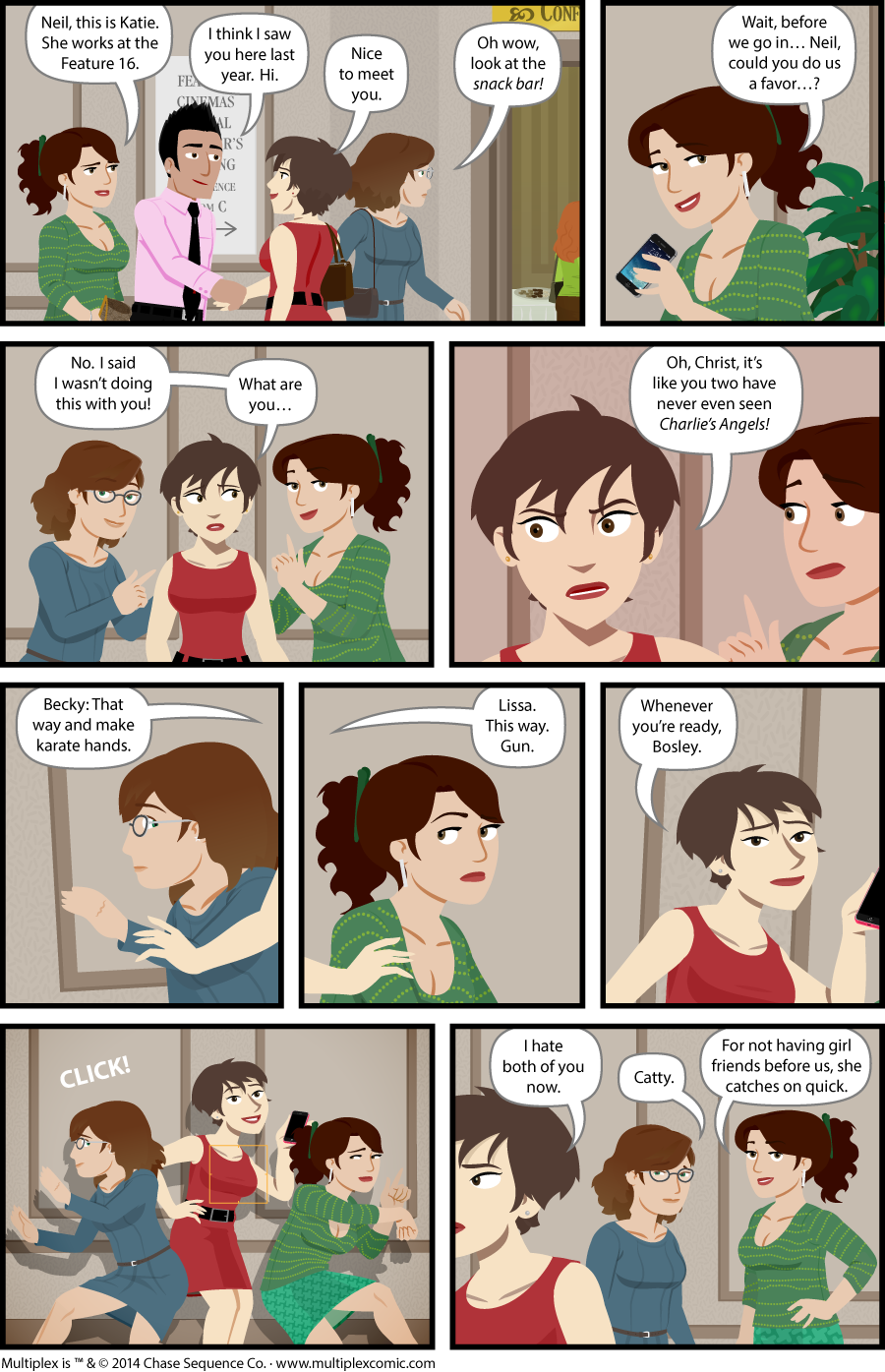From long-running soap operas to comedy-drama slices of life to daily gag strips, the digital comics scene has exploded over the last decade and readers have never had more options. Feeling overwhelmed? Christina Harrington and Joe Stando are here to take you on an expedition through the webcomics wilderness and show you the best specimens in our monthly Deadshirt Webcomics Field Guide.
There’s a subgenre of webcomic I haven’t touched on very much in the column yet, those that are partially or primarily based around a specific interest. Sometimes (at their most basic) these will follow the “two guys on a couch” archetype popularized by Penny Arcade, where the characters are essentially mouthpieces for the author(s)’ takes on the subject at hand. A more deft approach is to set the comic in a context where such opinions are relevant. Comic shop employees talking about comics, toy store employees talking about toys, etc. Multiplex, by Gordon McAlpin, is a webcomic about movie theater employees talking about movies.
But that’s selling it way too short. Multiplex is also an extremely solid sitcom-style comic, which has balanced humor and drama well over its extended run. It follows the employees of the fictional Multiplex 10 theater in Chicago, primarily goofball Kurt, cynic Jason, nerdy Becky, and long-suffering Melissa. Over the strip’s nearly ten-year run, they’ve been pranked, promoted, gotten in fights, made a zombie movie, and generally hung around. They’re supported by a large rotating cast of other employees, boyfriends and girlfriends, and customers, as well as the occasional talking action figure.
Multiplex is one of the gold standards of webcomics telling long-term stories. While I know it’s cheap to liken comics to other media, the series has the feel of some of the best long-running sitcoms like Parks and Recreation, where characters mature and develop over time, but never lose the initial fun characteristics that draw readers to them in the first place. The site design is also among the best I’ve seen, with links to relevant strips included in the “liner notes” in case readers need a refresher. The cast page is also clever, with characters organized by various groups and their bios up to date, but initially hidden for spoiler reasons. Ten years and nearly a thousand pages can be daunting, so it’s a nice consideration to allow new fans to jump in wherever.
There’s also been a clear progression over time, in terms of the voice and look of the series. Early Multiplex was simplistic in terms of the art, which sounds like a diss but I swear it isn’t. The series started out focusing more on gags than character dynamics, and a basic style worked well. As it grew, McAlpin honed his skills, developing a look similar to Scary Go Round’s computer-aided era before the lush current style. As a film buff, McAlpin has a fantastic command of composition, and he utilizes dynamic perspective panels and varying degrees of closeness like few other artists online. You know when you’re reading a webcomic and you realize you’ve never seen under a character’s chin, or the back of their ears? Doesn’t happen here.
The other thing I thought was worth mentioning ties back into what I alluded to up top, about strips that are focused on a specific interest. Too often, these devolve into screeds by the author(s), using their characters as mouthpieces and setting them up with reductive caricatures to beat up on. McAlpin appreciates that cinema is a wide and varied medium, so while you’ve got someone like Jason, who generally has the pretensions and cynicism we associate with most of the internet (albeit with usually good taste), he’s balanced with a character like Kurt, who’s just excited by cool blockbusters where things explode and people look badass. Even characters introduced essentially as whipping boys (like a movie blogger whose real name is never revealed) tend to develop and show shades of grey. The series avoids basic villains or antagonists and doesn’t go for the easy film punchlines (even “Michael Bay is the Devil” is pretty well lampshaded).
McAlpin has planned for roughly ten books of Multiplex, so at book eight, we’re closer to the end than the beginning. Still, judging by the pace there’s plenty of story left to tell, and with a relatively consistent update schedule (two or three times per week, depending on workload), it’s definitely a webcomic more people should be reading and talking about.
Multiplex updates Mondays and Fridays.



